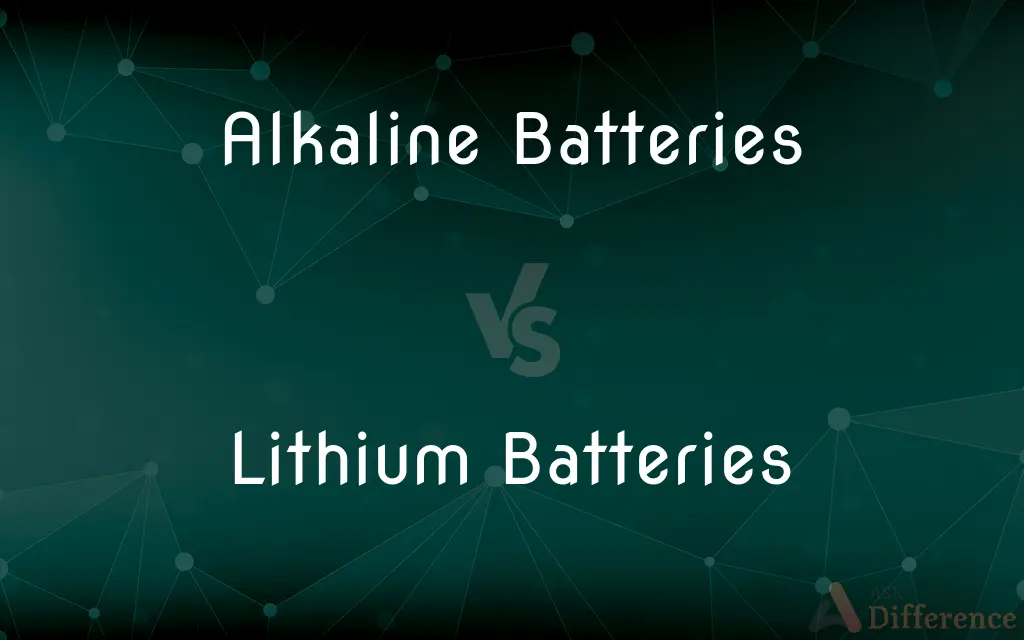Alkaline Batteries vs. Lithium Batteries — What's the Difference?
Edited by Tayyaba Rehman — By Fiza Rafique — Published on January 6, 2024
Alkaline Batteries use an alkaline electrolyte; they're affordable but have a shorter lifespan. Lithium Batteries use lithium compounds; they're lightweight, have a longer lifespan, but are pricier.

Difference Between Alkaline Batteries and Lithium Batteries
Table of Contents
ADVERTISEMENT
Key Differences
Alkaline Batteries are named after the alkaline electrolyte they use, primarily made of potassium hydroxide. On the other hand, Lithium Batteries are based on lithium compounds which act as the battery's anode. Both have unique characteristics and applications.
The primary advantage of Alkaline Batteries is their affordability. They are commonly used in household items like remote controls and toys. Lithium Batteries, in contrast, are often pricier but come with a much longer lifespan, making them a preferred choice for devices like cameras or smartphones.
When it comes to weight, Alkaline Batteries tend to be heavier compared to Lithium Batteries. This is why most portable electronics prefer the lightweight nature of Lithium Batteries. Additionally, Lithium Batteries usually have a higher energy density, offering more power in a smaller size.
The disposal of Alkaline Batteries is less of a concern, as many are free of hazardous materials. Lithium Batteries, however, require more careful disposal due to their chemical composition. It's essential to recycle them properly to avoid environmental damage.
Comparison Chart
Composition
Alkaline Electrolyte
Lithium Compounds
ADVERTISEMENT
Cost
Affordable
Pricier
Lifespan
Shorter
Longer
Weight
Heavier
Lightweight
Disposal Concerns
Fewer (many non-hazardous)
More (needs careful recycling)
Compare with Definitions
Alkaline Batteries
A non-rechargeable battery offering consistent energy output.
I prefer Alkaline Batteries for my wall clock because of their steady power.
Lithium Batteries
A type of battery known for its lightweight properties.
Portable gadgets often contain Lithium Batteries to reduce overall device weight.
Alkaline Batteries
A battery using an alkaline electrolyte, typically potassium hydroxide.
My remote control uses Alkaline Batteries to function.
Lithium Batteries
A battery utilizing lithium compounds as its anode.
Many smartphones use Lithium Batteries due to their long-lasting nature.
Alkaline Batteries
A battery with a longer shelf life than zinc-carbon variants.
I stock up on Alkaline Batteries because they don’t degrade quickly.
Lithium Batteries
A rechargeable or non-rechargeable battery variant with extensive applications.
From cars to watches, Lithium Batteries have a wide range of uses.
Alkaline Batteries
A primary cell with better energy density than zinc-carbon batteries.
Alkaline Batteries are ideal for devices that require prolonged power.
Lithium Batteries
A high-energy-density battery suitable for compact devices.
Lithium Batteries are the choice for many digital cameras because of their size and power.
Alkaline Batteries
A battery type prevalent in household electronic devices.
Most of the toys in our house run on Alkaline Batteries.
Lithium Batteries
A battery with a potential for higher voltage outputs.
High-performance devices often rely on Lithium Batteries for optimum functionality.
Common Curiosities
What is the main component in Alkaline Batteries?
Alkaline Batteries primarily use an alkaline electrolyte, often potassium hydroxide.
What's the lifespan comparison between Alkaline Batteries and Lithium Batteries?
Alkaline Batteries generally have a shorter lifespan, while Lithium Batteries last longer.
Are Alkaline Batteries rechargeable?
Typically, Alkaline Batteries are non-rechargeable, but there are some rechargeable variants.
Are Lithium Batteries safe?
Generally, yes. But they can pose risks if punctured, exposed to high heat, or improperly charged.
How should I store unused Alkaline Batteries and Lithium Batteries?
Store in a cool, dry place, away from metal objects and direct sunlight.
Do both battery types come in standard sizes like AA or AAA?
Yes, both Alkaline Batteries and Lithium Batteries are available in common sizes like AA and AAA.
Why are Lithium Batteries preferred in smartphones?
Lithium Batteries offer a longer lifespan, higher energy density, and are lightweight.
How do Lithium Batteries differ in composition?
Lithium Batteries are based on lithium compounds, which act as their anode.
Which battery type is more environmentally friendly?
Alkaline Batteries often have fewer hazardous materials, while Lithium Batteries need proper recycling.
Why are Lithium Batteries lighter?
The lithium compounds used in these batteries contribute to their lightweight nature.
How do the costs of Alkaline Batteries and Lithium Batteries compare?
Alkaline Batteries are generally more affordable, whereas Lithium Batteries are pricier.
Can Alkaline Batteries leak?
Yes, Alkaline Batteries can leak over time, especially if left in devices for extended periods.
Can I replace Alkaline Batteries with Lithium Batteries in any device?
Not always. Devices are designed for specific battery types, and switching can be harmful.
What's the energy density comparison between Alkaline Batteries and Lithium Batteries?
Lithium Batteries typically have a higher energy density compared to Alkaline Batteries.
Which battery type has a longer shelf life?
Lithium Batteries generally have a longer shelf life compared to Alkaline Batteries.
Share Your Discovery

Previous Comparison
Waterfall Model vs. Spiral Model
Next Comparison
Beige vs. TanAuthor Spotlight
Written by
Fiza RafiqueFiza Rafique is a skilled content writer at AskDifference.com, where she meticulously refines and enhances written pieces. Drawing from her vast editorial expertise, Fiza ensures clarity, accuracy, and precision in every article. Passionate about language, she continually seeks to elevate the quality of content for readers worldwide.
Edited by
Tayyaba RehmanTayyaba Rehman is a distinguished writer, currently serving as a primary contributor to askdifference.com. As a researcher in semantics and etymology, Tayyaba's passion for the complexity of languages and their distinctions has found a perfect home on the platform. Tayyaba delves into the intricacies of language, distinguishing between commonly confused words and phrases, thereby providing clarity for readers worldwide.













































